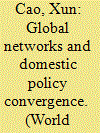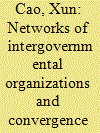| Srl | Item |
| 1 |
ID:
114495


|
|
|
|
|
| Publication |
2012.
|
| Summary/Abstract |
National economies are embedded in complex networks such as trade, capital flows, and intergovernmental organizations (igos). These globalization forces impose differential impacts on national economies depending on a country's network positions. This article addresses the policy convergence-divergence debate by focusing on how networks at the international level affect domestic fiscal, monetary, and regulatory policies. The author presents two hypotheses: first, similarity in network positions induces convergence in domestic economic policies as a result of peer competitive pressure. Second, proximity in network positions facilitates policy learning and emulation, which result in policy convergence. The empirical analysis applies a latent-space model for relational/dyadic data and indicates that position similarity in the network of exports induces convergence in fiscal and regulatory policies; position similarity in the network of transnational portfolio investments induces convergence in fiscal policies; and position proximity in igo networks is consistently associated with policy convergence in fiscal, monetary, and regulatory policies.
|
|
|
|
|
|
|
|
|
|
|
|
|
|
|
|
| 2 |
ID:
092343


|
|
|
|
|
| Publication |
2009.
|
| Summary/Abstract |
We studied three potential causal mechanisms through which network dynamics of intergovernmental organizations (IGO) might cause convergence in domestic economic policies. First, IGO networks facilitate policy learning by providing relevant information. Second, they encourage policy emulation by creating a sense of affinity among countries that are closely connected by IGO networks. Finally, some powerful IGOs ''coerce'' their member states to adopt certain policies. We used causal modeling to test the relationships between different types of IGOs (and the causal mechanisms to which they mostly correspond) and policy convergence. The findings demonstrate the important roles played by salient IGOs such as the WTO, the EU, and the OECD, with each of them having a strong converging effect on their member states' domestic economic policies. More interestingly, we find that the cumulative effects of multiple layers of even the weakest types of IGOs have strong causal effects on states' domestic policies. Indeed, the shared memberships in IGOs with economic functions and with the minimal level of institutional capacity are not only statistically associated with, but also have converging causal effects on, countries' domestic policies. This supports the information-driven policy learning mechanism. The emulation mechanism in which IGO networks create a sense of affinity and therefore facilitate policy diffusion and convergence, on the other hand, is not supported by empirical analysis.
|
|
|
|
|
|
|
|
|
|
|
|
|
|
|
|